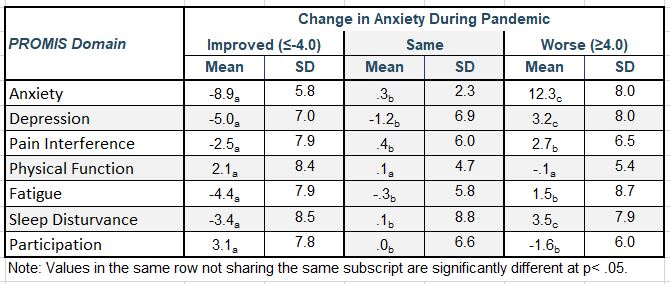Session Information
Session Type: Poster Session D
Session Time: 8:30AM-10:30AM
Background/Purpose: Rheumatic diseases (RD) are chronic conditions that require potent immunosuppressants to control systemic inflammation. Fears associated with increased vulnerability from being on immunosuppressants plus medications shortages (e.g., hydroxychloroquine) resulted in considerable stress for patients in the early months of the COVID-19 pandemic. We evaluated changes in HRQL in the initial months of the COVID-19 in adults with RD and hypothesized that multiple PROMIS-29 domains scores would be negatively impacted.
Methods: The sample included patients followed (virtually or in-person) in Rheumatic Disease clinics at Johns Hopkins 3/15/2020 to 6/30/2020. Patients complete the PROMIS-29 as part of routine care, and scores were compared with the most recent visit prior to 3/15. Anxiety was classified as worse (≥ 4.0 points), same (-3.9 to 3.9) or better (≤-4.0) at the second visit.
Results: Data were available for 151 patients with a mean (SD) age of 55 who were mostly white (81%) women (73%) with RA (50%), PSA (27%), AS/SPA (15%) or other RD (9%). Mean (SD) changes in PROMIS-29 scores ranged from -0.9 for Fatigue [7.6] and Depression [7.9] to 1.4 (9.7) for Anxiety. 45 (30%) patients were classified with worse anxiety, 40 (27%) with improved anxiety, and 66 (44%) the same. Change in anxiety was not associated with age, sex, race, or disease.
Among patients reporting worse anxiety (mean [SD] change +12.3 [9.0]), Depression was significantly worse (3.2 [8.0]) compared to patients with same (-1.2 [6.9] or improved anxiety (-5.0 [7.0]) (p’s< .05). Among patients whose anxiety improved, Fatigue (-4.4 [7.9]) and Participation (3.1 [7.8] improved. Changes in anxiety were not associated with changes in physical function.
Patient Global Impression of Disease Change scores (N=128) indicated 34% of patient reported their disease was worse, 30% had improved, and 36% were the same. Most (88%) patients with worse anxiety reported worse (45%) or the same (43%) disease activity; 43% with improved anxiety had improved disease, 30% the same, and 27% were worse.
Conclusion: While the average within-person change in PROMIS-29 scores were trivial, a substantial proportion of patients experienced worsening or improved anxiety which also tracked with meaningful changes in several other PROMIS-29 domains.
 Table 1. PROMIS_29 scores in patients with rheumatic diseases before and during initial months of COVID_19 pandemic.
Table 1. PROMIS_29 scores in patients with rheumatic diseases before and during initial months of COVID_19 pandemic.
 Table 2. Change in PROMIS in patients with improved, same or worsening anxiety during the initial months of COVID_19 pandemic
Table 2. Change in PROMIS in patients with improved, same or worsening anxiety during the initial months of COVID_19 pandemic
 Table 3. Change in perceived rheumatic disease activity in patients with improved, same or worsening anxiety during the initial months of COVID_19 pandemic.
Table 3. Change in perceived rheumatic disease activity in patients with improved, same or worsening anxiety during the initial months of COVID_19 pandemic.
To cite this abstract in AMA style:
Bartlett S, DiRenzo D, Jones M, Bingham C. Many Better, Many Worse: Mean PROMIS-29 Scores Mask Significant Shifts During COVID-19 in RA [abstract]. Arthritis Rheumatol. 2021; 73 (suppl 9). https://acrabstracts.org/abstract/many-better-many-worse-mean-promis-29-scores-mask-significant-shifts-during-covid-19-in-ra/. Accessed .« Back to ACR Convergence 2021
ACR Meeting Abstracts - https://acrabstracts.org/abstract/many-better-many-worse-mean-promis-29-scores-mask-significant-shifts-during-covid-19-in-ra/
